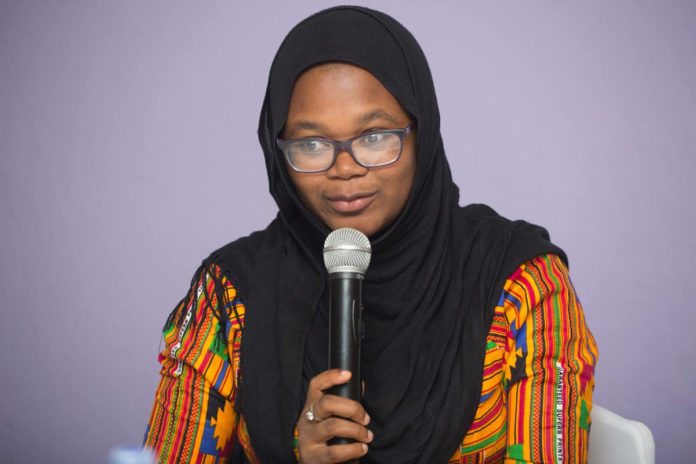Musu Bakoto Sawo, winner of the Daily Trust African of the Year award, began activism at the age of nine and has been championing the cause of the girl-child for 21 years. The 30-year-old, who holds an LLM in Human Rights and Democratisation in Africa, also teaches law at the University of Gambia. Pushed by her experiences as a victim of female genital mutilation (FGM), getting married at the age of 14 and becoming a widow at 21, Sawo has risen to become a leading voice in the fight against FGM, violence against women and early marriage for girls in The Gambia. Through the work of organisations like her Think Young Women, The Gambia banned FGM in 2015 and early marriage in 2016.
Daily Trust: Being a victim of female genital mutilation, getting married at the age of 14 and becoming a widow at 21, how were you able to pick yourself up to become who you are today?
Musu Bakoto Sawo: When it happened, I thought about everything else that I wanted to be while growing up, how I did not want to be like my mother, although she was an absolutely amazing woman and a great human being but she gave up her life for a family, for her children.
I saw how she lived in the household with zero say in anything that was done.
- States ‘squander’ billions as ruling parties clear LG polls
- FG, quickly avert varsity workers’ strike
At some point, when the marriage happened, I gave up because I felt the systems had failed me being a child rights activist.
I started activism at the age of nine, and being married off at 14, I felt the system did not protect me or any of the other girls.
I realised that if I did nothing, I would end up being that woman who would not have a voice; that woman who would not have a say, and I would be just a figure.
So, I rebelled against that thought and idea and I was like, No! I want to be better.
I wanted to be a lawyer. I wanted to have a voice. I wanted to be able to speak on behalf of girls who were going through what I had gone through.
If I had sat down and accepted my fate as someone who was married off at that age, then, I would be all of the things I didn’t want to be.
That was the reason I picked up the fight.
I couldn’t change the fact that I was married, that was a decision that had been taken by the family because in our own context, marriage is not just about you and your spouse, rather it was among you, your spouse, his family and your family.
I was like, what am I going to do to ensure that I got access to education?
So, I threatened my family that if they didn’t let me go to school, I was going to kill myself.
So, they negotiated with the groom’s family that I would have to complete high school and that was how I continued going to school.
What was it like going into activism at the age of 9?
When I was growing up, I was a very vocal child.
I belonged to a few child-led organisations. That platform gave me an opportunity to be an advocate.
But it all began in primary school when a teacher of mine saw that I had potentials and began to take me out to represent my school in public speaking activities, in debates and other activities.
That was how I was emboldened to become a child rights advocate. I also had the passion.
Did the fact that you were a victim of FGM have anything to do with your activism?
Growing up, girls who went through FGM were celebrated.
I remember that when I left the village and came back home, I went to school with my jujus (beads) around my neck with pride because I was told that I was cleaner, I was better than the other girls who had not gone through FGM.
So, at that time, I thought it was okay. It was during the birth of my first child that I really lived the experience of female genital mutilation.
I had been trained as a child rights activist about FGM, and I had been speaking against it but I didn’t really know that the impact was beyond what we were taught. It took me three days to deliver my baby.
I ended up having an episiotomy because I couldn’t have the baby on my own.
I remember also that during the consummation of my first marriage, it took three days for mere penetration to happen and I remember how horrific and painful that process was.
I could not imagine any girl going through that, so I had to speak.
Gambia is a traditional society, how were your activities perceived?
I remember there was a bill board that was created which had my daughter and I, and I said I would protect my daughter from being cut.
And a few people called my family to say that I was being used to speak against them, to give my family a bad name.
I have always been stubborn. At some point, when I got married, my family wanted me to stop activism.
They wanted me to stop speaking, because for many women in our context, once you are married, your husband is supposed to be your leader.
You have to draw inspirations from him, you have to be respectful, you have to be obedient.
So, there was a lot of backlash from my family. I was perceived as someone who was going to hell.
That I wasn’t religious, that I was the one putting things in the heads of women and confusing them.
But I learnt about my religion, because I knew that religion was used as a reinforcement of patriarchy mainly because many women, particularly Muslim women, were not given much opportunity to learn about their religion.
I learnt about my religion, drawing inspiration from great and positive women Islamic leaders who had been using the scriptures to advance women’s rights.
I found comfort in that – learning about that same tool (religion) which they use in The Gambia against women, so that someone else will not have to provide me with an interpretation that favours them, rather, an interpretation that is genuine. And the joy I have is that a lot of change has come through my work.
How big is the problem of FGM and early marriage in The Gambia?
Seventy six per cent of women in The Gambia, have gone through FGM and this is a country that has a population of 2.3 million. Out of that 2.3million, 51 per cent of our population are women. Yet, 76% of those women have gone through FGM, which has been recognised as a harmful traditional practice. For child marriage, over 30% of girls in The Gambia have been married off before the age of 18. This again is a significant figure for our country. So, it is deep rooted, especially for a small community and there is need for actions to be taken.
What would you say are the major drivers of these practices in The Gambia?
I would say the leading factor is the traditional beliefs, because there are misconceptions around FGM in religious obligations, particularly among Muslims, that it is a requirement of Islam that women should be cut.
This is mere misconception because in our context, religion and culture have intertwined so much that we can’t sometimes distinguish between the two. We can’t distinguish what is a religious obligation and what is a traditional belief. At our organisation, we use religious leaders who try to clear the misconception about FGM, that it is a harmful traditional practice, not religious obligation.
Poverty also plays a fundamental role. A family would give away a girl child because it wants to take off some burden, because it is hoping that the spouse would bring wealth into that family.
Legislation is another issue. Sometimes, there is no legal framework that protects girls from these harmful traditional practices.
In The Gambia, it was only in 2015 that FGM was banned and child marriage was banned in 2016.
So, for the longest time, we didn’t have the law, and even now that we have the law, the problem is that there are no implementation and enforcement mechanisms in place to facilitate the full realization of these laws.
How did you feel when you heard about the award?
I am still taking it in. One day in the evening, I was leaving a meeting, then I received an email that said, Musu Bakoto Sawo is winner of Daily Trust African of the Year award.
I was shocked, then I said, ‘this must be a scam’.
After an hour, I went back to the email and read it again.
Then I went to the paper’s website, and I began to think that it could be real.
I was lost because I did not know how they even heard about me.
After a while, I received a call from someone at the UN, to say I was nominated for something a while back.
That was when it connected and I started crying because I was like, this is huge.
Before now, did you know about the Daily Trust award?
No. I did not have a clue. Honestly, it came as a very pleasant surprise.
And when I saw the calibre of past recipients and read about members of the selection committee, I was very humbled and elated.
I still have not been able to fully process it.
How will this award impact your work?
It is going to push me to continue fighting for what I believe in. It is another opportunity to continue to help communities, and I will do just that.
I have dedicated my life to service and I feel this is my purpose, to use my story to change the narratives, to use my story to create meaningful impact.

 Join Daily Trust WhatsApp Community For Quick Access To News and Happenings Around You.
Join Daily Trust WhatsApp Community For Quick Access To News and Happenings Around You.


